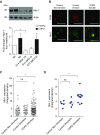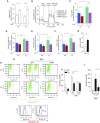Impaired Mitochondrial Microbicidal Responses in Chronic Obstructive Pulmonary Disease Macrophages
- PMID: 28557543
- PMCID: PMC5649972
- DOI: 10.1164/rccm.201608-1714OC
Impaired Mitochondrial Microbicidal Responses in Chronic Obstructive Pulmonary Disease Macrophages
Abstract
Rationale: Chronic obstructive pulmonary disease (COPD) is characterized by impaired clearance of pulmonary bacteria.
Objectives: The effect of COPD on alveolar macrophage (AM) microbicidal responses was investigated.
Methods: AMs were obtained from bronchoalveolar lavage from healthy donors or patients with COPD and challenged with opsonized serotype 14 Streptococcus pneumoniae. Cells were assessed for apoptosis, bactericidal activity, and mitochondrial reactive oxygen species (mROS) production. A transgenic mouse line in which the CD68 promoter ensures macrophage-specific expression of human induced myeloid leukemia cell differentiation protein Mcl-1 (CD68.hMcl-1) was used to model the molecular aspects of COPD.
Measurements and main results: COPD AMs had elevated levels of Mcl-1, an antiapoptotic B-cell lymphoma 2 family member, with selective reduction of delayed intracellular bacterial killing. CD68.hMcl-1 AMs phenocopied the microbicidal defect because transgenic mice demonstrated impaired clearance of pulmonary bacteria and increased neutrophilic inflammation. Murine bone marrow-derived macrophages and human monocyte-derived macrophages generated mROS in response to pneumococci, which colocalized with bacteria and phagolysosomes to enhance bacterial killing. The Mcl-1 transgene increased oxygen consumption rates and mROS expression in mock-infected bone marrow-derived macrophages but reduced caspase-dependent mROS production after pneumococcal challenge. COPD AMs also increased basal mROS expression, but they failed to increase production after pneumococcal challenge, in keeping with reduced intracellular bacterial killing. The defect in COPD AM intracellular killing was associated with a reduced ratio of mROS/superoxide dismutase 2.
Conclusions: Up-regulation of Mcl-1 and chronic adaption to oxidative stress alter mitochondrial metabolism and microbicidal function, reducing the delayed phase of intracellular bacterial clearance in COPD.
Keywords: Streptococcus pneumoniae; apoptosis; mitochondrial reactive oxygen species.
Figures






Comment in
-
Flipping the kill switch.Sci Transl Med. 2017 Jun 21;9(395):eaan6192. doi: 10.1126/scitranslmed.aan6192. Sci Transl Med. 2017. PMID: 28637925
References
-
- Willemse BW, ten Hacken NH, Rutgers B, Lesman-Leegte IG, Postma DS, Timens W. Effect of 1-year smoking cessation on airway inflammation in COPD and asymptomatic smokers. Eur Respir J. 2005;26:835–845. - PubMed
-
- van Gemert F, Kirenga B, Chavannes N, Kamya M, Luzige S, Musinguzi P, Turyagaruka J, Jones R, Tsiligianni I, Williams S, et al. Prevalence of chronic obstructive pulmonary disease and associated risk factors in Uganda (FRESH AIR Uganda): a prospective cross-sectional observational study. Lancet Glob Health. 2015;3:e44–e51. - PubMed
-
- Wilkinson TM, Patel IS, Wilks M, Donaldson GC, Wedzicha JA. Airway bacterial load and FEV1 decline in patients with chronic obstructive pulmonary disease. Am J Respir Crit Care Med. 2003;167:1090–1095. - PubMed
Publication types
MeSH terms
Substances
Grants and funding
LinkOut - more resources
Full Text Sources
Other Literature Sources
Medical
Molecular Biology Databases

